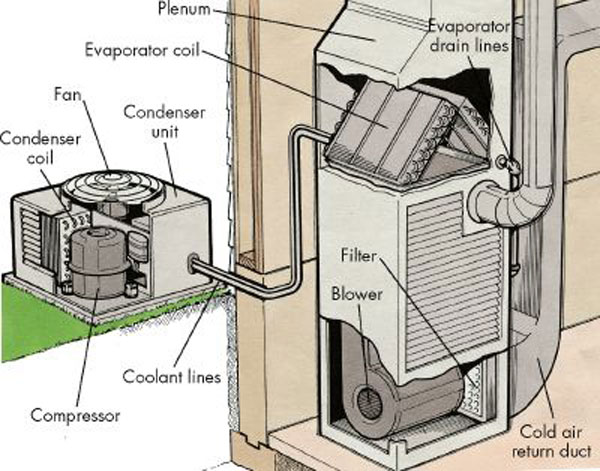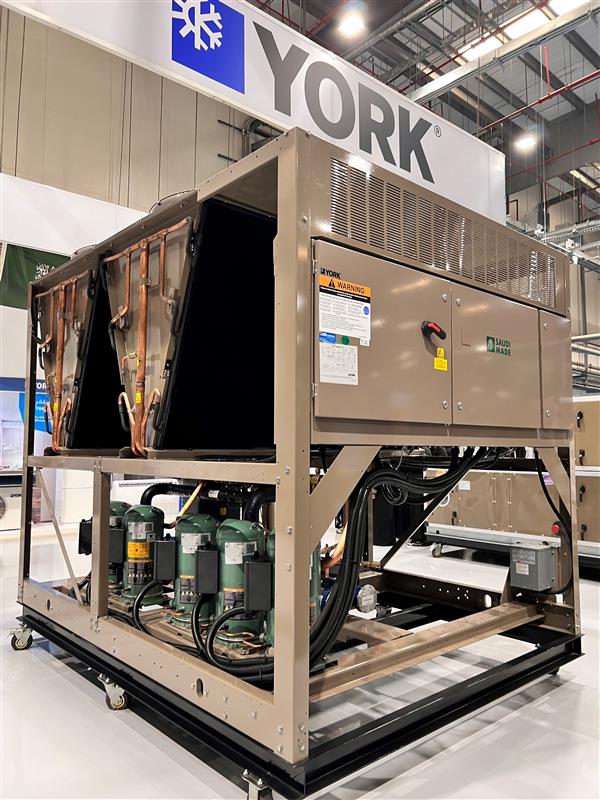Explore how HVAC experts provide same-day repair options
Wiki Article
Checking Out the Important Elements of an Efficient A/c System
An efficient heating and cooling system is constructed on numerous critical elements that operate in harmony. Each part, from the thermostat to the ductwork, plays a vital duty in keeping comfort and power efficiency. Understanding these elements is crucial for optimizing performance and boosting interior air high quality. As one analyzes these elements, the intricate relationships in between them disclose understandings into improving overall system efficiency. What details variables contribute most to this efficiency?The Function of the Thermostat in A/c Effectiveness
Although often forgotten, the thermostat plays an important function in the effectiveness of cooling and heating systems. HVAC experts. This little tool works as the key nerve center, controling temperature level settings and making certain suitable convenience within a space. By precisely picking up the ambient temperature level, the thermostat communicates with the home heating, ventilation, and air conditioning systems to preserve the wanted climate
An effective thermostat reduces energy usage by triggering the cooling and heating system only when needed, thereby avoiding too much heating or air conditioning. Modern programmable and smart thermostats improve this performance further by enabling users to establish schedules and from another location change settings, adjusting to everyday regimens.
Furthermore, the positioning of the thermostat is important; incorrect place can result in inaccurate temperature readings, leading to ineffective operation. On the whole, a well-functioning thermostat not only boosts comfort but likewise contributes significantly to power cost savings and the longevity of the cooling and heating system.
Comprehending the Significance of Air Filters
Air filters serve a necessary function in HVAC systems by ensuring that the air circulating within an area continues to be healthy and balanced and tidy. These filters trap dirt, irritants, and various other pollutants, stopping them from being recirculated throughout the atmosphere. By capturing these particles, air filters add to enhanced indoor air top quality, which can greatly profit passengers' health, especially those with allergies or respiratory system conditions.Additionally, maintaining clean air filters enhances the efficiency of cooling and heating systems. Clogged up filters can restrict air movement, triggering the system to work more difficult to keep preferred temperatures, causing boosted power intake and higher utility costs. Consistently changing or cleaning filters is a crucial maintenance action that can prolong the lifespan of a/c tools. Ultimately, recognizing the relevance of air filters enables home owners and building supervisors to take proactive procedures to assure a well-functioning, reliable a/c system that advertises a safe and comfortable interior setting.

The Capability of the Furnace and Heat Pump
Furnaces and heatpump are critical elements of cooling and heating systems, in charge of offering heat during chillier months. Heaters operate by heating air with burning or electric resistance, then dispersing it throughout the home by means of ducts. They normally provide fast heating and can be fueled by gas, electrical power, or oil, depending upon the system kind.Conversely, warm pumps move heat instead of produce it. They remove warmth from the outside air or ground, also in reduced temperature levels, and move it indoors. HVAC experts. This double capability permits heat pumps to additionally supply air conditioning in warmer months, making them flexible alternatives for year-round environment control
Both systems need proper maintenance to ensure effectiveness and durability. While furnaces succeed in extreme cold, warm pumps can be useful in modest environments. Recognizing their distinct capabilities aids property owners in picking the most suitable option for their home heating requires.
Exploring the A/c System
The air conditioning unit is a crucial element of a/c systems, readily available in numerous kinds to match different demands. Comprehending the effectiveness ratings of these devices is essential for making informed selections concerning power usage and price. This area will certainly discover the diverse kinds of a/c unit and clear up just how performance rankings effect efficiency.Sorts Of Air Conditioners
While numerous elements influence the selection of cooling systems, understanding the different kinds available is important for house owners and building supervisors alike. Learn More Here Central air conditioners are made to cool down entire homes or structures, using a network of ducts for air movement. Window devices use a more localized option, suitable for solitary rooms or tiny spaces. Portable ac unit give versatility, allowing customers to move the system as needed. Ductless mini-split systems are an additional option, integrating the performance of central systems with the convenience of zoning, as they need no ductwork. Geothermal systems harness the earth's temperature level for energy-efficient cooling. Each type features unique benefits, making educated selections crucial for effective climate control.
Performance Ratings Discussed
Recognizing efficiency scores is necessary for selecting the ideal a/c system, as these metrics give understanding right into the system's efficiency and power consumption. The most typical score for a/c is the Seasonal Power Performance Proportion (SEER), which gauges the cooling result throughout a typical cooling period separated by the complete electric power input. A greater SEER shows better effectiveness. Furthermore, the Power Efficiency Proportion (EER) is made use of for determining efficiency under particular problems. Another essential metric is the Power Star accreditation, which symbolizes that a system satisfies strict power performance standards. By evaluating these rankings, customers can make informed selections that not only optimize comfort however likewise minimize power prices and environmental impact.The Importance of Ductwork and Air flow
Efficient ductwork style and air movement monitoring play vital roles in the total efficiency and performance of HVAC systems. Proper ductwork guarantees that conditioned air is dispersed equally throughout a space, lessening temperature level fluctuations and enhancing comfort. Properly designed air ducts minimize resistance to air flow, reducing the work on HVAC equipment and eventually reducing energy intake.Air flow monitoring entails tactically positioning vents and registers to boost the circulation of air. This stops common problems such as chilly or hot areas, which can happen when airflow is blocked or inadequately well balanced. In addition, the appropriate duct products and insulation can even more improve effectiveness by reducing heat loss or gain throughout air transportation.
An effective ductwork system not only adds to energy savings but can likewise extend the lifespan of heating and cooling devices by minimizing unneeded pressure (HVAC experts). As a result, recognizing the significance of ductwork and air flow is vital for attaining peak cooling and heating system performance
Routine Maintenance Practices to Boost Performance
Regular upkeep techniques are essential for guaranteeing peak efficiency of HVAC systems. These techniques include routine inspections, cleansing, and required fixings to keep the system running successfully. Routinely changing air filters is important, as blocked filters can block airflow and lower effectiveness. Furthermore, professionals need to inspect and tidy evaporator and condenser coils to stop getting too hot and energy wastefulness.Annual professional assessments are also advised, as qualified specialists can recognize possible problems prior to they escalate. Lubricating moving components lessens deterioration, adding to a longer life expectancy for the system. Furthermore, ensuring that the pop over to this site thermostat operates properly help in preserving ideal temperature level control.

Frequently Asked Inquiries
Just how Typically Should I Replace My Thermostat?
Thermostats must typically be replaced every 5 to 10 years, depending upon usage and modern technology advancements. Routine checks are recommended to assure peak efficiency, specifically if experiencing irregular temperature control or raised power costs.What Dimension Air Filter Is Best for My Heating And Cooling System?
The most effective size air filter for a HVAC system differs by system layout. Commonly, it's crucial to consult the proprietor's handbook or original site examine the existing filter dimensions to assure peak efficiency and air quality.Can I Install a Warmth Pump Myself?
Mounting a warmth pump separately is feasible for skilled people, but it needs expertise of electric systems and neighborhood codes. Working with an expert is recommended to guarantee appropriate installment and excellent system performance.How Do I Know if My Ductwork Is Effective?
To determine ductwork performance, one must check for leaks, measure airflow at vents, examine insulation high quality, and examine temperature level differences in between supply and return ducts. Expert evaluations can give detailed insights right into total performance.What Are Indications My HVAC Requirements Immediate Upkeep?
Signs that an a/c system requires immediate upkeep include uncommon sounds, irregular temperature levels, increased power expenses, undesirable odors, and frequent cycling. Resolving these concerns promptly can stop more damages and assurance height system efficiency.Air filters serve a necessary function in HVAC systems by guaranteeing that the air distributing within an area stays healthy and clean. Furthermore, keeping clean air filters improves the effectiveness of Cooling and heating systems. Ductless mini-split systems are one more option, incorporating the performance of main systems with the convenience of zoning, as they need no ductwork. Comprehending efficiency scores is necessary for selecting the ideal air conditioning device, as these metrics offer understanding into the system's efficiency and power intake. The best size air filter for an A/c system varies by system layout.
Report this wiki page